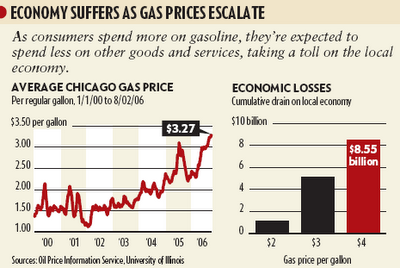Jessica Holzer of Forbes asks whether the red hot real estate market is heading for a crash. In general she says it seems to be heading for a soft (rather than crash) landing. Here is an excerpt from her article. For a full view of the article click on this blog title (or here).
Pessimists argue that a housing bust will dampen consumer spirits and spending power, raising the risk of recession.
There are several reasons to reject this gloomy view. For starters, the economy is in good shape to absorb a slump in housing. Businesses are spending briskly on capital goods, and exports are strong. Despite the U.S. Federal Reserve's recent rate-tightening, interest rates remain low by historical standards. In short, as housing cools, other booming sectors are likely to offset the effects of the slowdown.
"The economy's a lot more dynamic that people make it out to be," says Mark Vitner, a senior economist at Wachovia Securities in Charlotte.
There is also an upside to a slowdown in the housing market: It will make it far easier for the Fed to rein in rising inflation without further rate hikes, argues Steven Wieting, the leading economist for U.S. equities at Citigroup.
And unlike the tech bust of the late 1990s, which caught investors and business off-guard, a slump in housing has long been predicted.
"It's the channel in which you should expect the slowing in the economy to take place," Wieting says.
In any case, the housing market isn't in the dire straits that it might seem. While overheated markets on the coasts are cooling, home sales are picking up in places like Texas, Georgia and North Carolina. Meanwhile, investment is pouring into non-residential construction, which will help mitigate the slowdown in housing by soaking up workers in construction, architecture and other fields.
So far, consumer spending is holding up. "It is decelerating, but it's not falling out of bed," says Nariman Behravesh, the chief economist at Global Insight, an economic forecasting firm in Lexington, Mass.
Partly, this is because households have accumulated wealth that will support their spending as equity withdrawals slow. According to the Federal Reserve, household net worth excluding housing wealth or liabilities ballooned by $3.5 trillion in the past year.
"The consumer balance sheet is big and getting bigger in both directions, with both assets and liabilities going up," Wieting says.
Thursday, August 24, 2006
No Buyers in this Buyers Market?
August 24, 2006
Ironically, I have not had a better month in terms of getting buyer clients in a while, but the general news is that the buyers are not taking advantage of the pricing and homes available in the Chicago region. Rates are low. Lots of homes to choose from makes this a great time to buy as long as you are planning on staying in the home for a minimum of two to three years.
Here is an AP article on the latest housing news for Chicago:
House hunters shied away from buying in July, driving down sales of previously owned homes to a 2-1/2-year low. The inventory of unsold homes climbed to a record high.
The new figures, released Wednesday, provided fresh evidence of how much the once-sizzling housing market has cooled.
Existing-home sales dropped 4.1 percent in July from the previous month to a seasonally adjusted annual rate of 6.33 million units, the National Association of Realtors reported. That was the lowest level since January 2004.
Sales were weaker than expected, with economists forecasting 6.55 million units.
Investors, believing that housing sales might be dropping more rapidly than anticipated, sent stocks down for a third straight session. The Dow Jones industrial average lost 41.94, or 0.37 percent, closing at 11,297.90. The Standard & Poor's 500 index fell 5.83, or 0.45 percent, to 1,292.99, and the Nasdaq composite index dropped 15.36, or 0.71 percent, to 2,134.66.
The data comes after a Federal Reserve official hinted Tuesday that higher interest rates may still be needed to tame inflation, a move that could curtail consumer spending. Retailers and home builders, which have the most exposure to consumers, led major indexes lower.
''The focus now is on housing as the market shifts away from inflation and toward growth,'' said John Caldwell, chief investment strategist for McDonald Investments. ''The question is has the Fed done too much, and is housing going to lead us down.''
Although sales prices for homes are no longer bounding ahead, some prospective buyers are still waiting for better deals -- another factor in the weak showing, economists said.
''Many potential home buyers have been on the sidelines, some kicking the tires but mostly waiting for sellers to compromise on prices and terms,'' said David Lereah, the NAR's chief economist.
The median nationwide price of a home sold last month was $230,000, up just 0.9 percent from the same month last year. The median price is the middle point, where half sell for more and half sell for less.
Meanwhile, the inventory of unsold homes in July rose to a record high of 3.86 million. At the current sales pace, it would take 7.3 months to exhaust that overhang. That is the longest period to exhaust the supply of homes since the spring of 1993.
The Illinois Association of Realtors said July home sales were down 11.7 percent to 15,973 homes sold, compared to 18,089 sales in July 2005. The state's median home sale price in July was $214,000, up 2.4 percent from a year earlier.
AP
Ironically, I have not had a better month in terms of getting buyer clients in a while, but the general news is that the buyers are not taking advantage of the pricing and homes available in the Chicago region. Rates are low. Lots of homes to choose from makes this a great time to buy as long as you are planning on staying in the home for a minimum of two to three years.
Here is an AP article on the latest housing news for Chicago:
House hunters shied away from buying in July, driving down sales of previously owned homes to a 2-1/2-year low. The inventory of unsold homes climbed to a record high.
The new figures, released Wednesday, provided fresh evidence of how much the once-sizzling housing market has cooled.
Existing-home sales dropped 4.1 percent in July from the previous month to a seasonally adjusted annual rate of 6.33 million units, the National Association of Realtors reported. That was the lowest level since January 2004.
Sales were weaker than expected, with economists forecasting 6.55 million units.
Investors, believing that housing sales might be dropping more rapidly than anticipated, sent stocks down for a third straight session. The Dow Jones industrial average lost 41.94, or 0.37 percent, closing at 11,297.90. The Standard & Poor's 500 index fell 5.83, or 0.45 percent, to 1,292.99, and the Nasdaq composite index dropped 15.36, or 0.71 percent, to 2,134.66.
The data comes after a Federal Reserve official hinted Tuesday that higher interest rates may still be needed to tame inflation, a move that could curtail consumer spending. Retailers and home builders, which have the most exposure to consumers, led major indexes lower.
''The focus now is on housing as the market shifts away from inflation and toward growth,'' said John Caldwell, chief investment strategist for McDonald Investments. ''The question is has the Fed done too much, and is housing going to lead us down.''
Although sales prices for homes are no longer bounding ahead, some prospective buyers are still waiting for better deals -- another factor in the weak showing, economists said.
''Many potential home buyers have been on the sidelines, some kicking the tires but mostly waiting for sellers to compromise on prices and terms,'' said David Lereah, the NAR's chief economist.
The median nationwide price of a home sold last month was $230,000, up just 0.9 percent from the same month last year. The median price is the middle point, where half sell for more and half sell for less.
Meanwhile, the inventory of unsold homes in July rose to a record high of 3.86 million. At the current sales pace, it would take 7.3 months to exhaust that overhang. That is the longest period to exhaust the supply of homes since the spring of 1993.
The Illinois Association of Realtors said July home sales were down 11.7 percent to 15,973 homes sold, compared to 18,089 sales in July 2005. The state's median home sale price in July was $214,000, up 2.4 percent from a year earlier.
AP
Sunday, August 13, 2006
Our One Year Blog-iversary
Live Chat is Here
In an attempt to break down the walls of blogging and posting (and timidity about calling a 'stranger') I have introduced LIVE CHAT on my Chicago HomeBUZZ blog.
If you have any questions or would like to chat live about any real estate topic, if you see my picture on this site in the right column it means I am available to talk.
Questions about the market? Let's chat.
Questions about investing in real estate? Let's chat.
Our chat will be between us only and will not be posted (although I believe there is a feature I can get if it becomes popular) where we can all chat together live in a virtual conversation.
Pretty cool.
Whenever I am at my office making calls or catching up on paperwork, I will have the feature on so give it a try.
And thanks for all my loyal subscribers. After one year of blogging, we are up to 10 subscribers!
If there is a topic you'd like me to discuss let me know.
Wednesday, August 09, 2006
Gas Prices Drain Local Economy

Crains Chicago Business's Paul Merrion wrote a great column in Crains this week about the effect the raising gas prices are having on our local (and national economy).
They conducted a study which shows that for every dollar a gallon of gas goes up job losses almost double!
36,260 jobless when gas was $2/gallon
61,000 jobless at $3/gallon
and a projected
102,420 at $4/gallon.
It broke down to over $5 billion removed from our local economy and spent on gas instead. The powerful impact of microeconomics has always fascinated me, but these numbers are staggering.

Customize your ChicagoHOMEBUZZ
I wanted to let you know you can customize your feedblitz account which is used to manage this blog. You can change your account to receive posts once they are made (default setting) or weekly or at whatever rate you request. Email me if you are interested in this option and thanks for subscribing. Our subscription list is growing each day.
Forward the link to help spread the Chicago home buzz....
Thanks for your interest
Jim
Forward the link to help spread the Chicago home buzz....
Thanks for your interest
Jim
Rate Hikes Pauses: Who Cares?

Yes in an historic move (not done in the last 18 months anyways) the Federal Reserve Board has decided to halt their consecutive increase in interest rates at their meeting yesterday.
What does this mean for mortgages?
Not much.
What does this mean if you have a home equity loan or any other adjustable short term interest loan?
It means your monthly adjustable payment did not go up as it may have the past 18 months. I have a home equity loan that has gone from $300 a month to almost $700 a month. Yikes. I'd say I am quite interested in the Feds policy decisions.
But what about how this is affecting my business?
People are asking if I am waiting anxiously for good news from the Fed and I try to explain the Fed only affects a small (yet important) fraction of my business population. The larger proportion of my business is driven by the bond market as I've posted in the past. The graph as shown in the Chicago Tribune yesterday was very telling.
It showed the monthly rate increase after 9/11/01 stepping its way up to today's current level. Then it showed mortgage rates, the backbone of my business. Over that same period of time it is quite steady (actually went down to 6 3/8% last week but had a short uptick last night). Rates are incredibly low now. Now they will most likely not return to the level we saw just following the fall of 2001 unless we see another national catastrophe, but we are still experiencing an excellent time to lock in to a long term (30 year) mortgage depending of course on your goals.
The rates rise and fall like the tide but are not showing a steady increase like short term rates (Fed related).
Finally, and I will post a longer blog on this topic later, I think now is a great time to buy (now you smile and say "of course you do, its your business to want people to buy (or sell).
But I am seeing this slowdown in the economy as real opportunity. There are millions of home on the market nationally that are sitting longer and longer since there are less and less buyers. This means prices are dropping and competition is shifting away from a sellers market and towards a buyers market.
This means opportunity for buyers.
In our area, I am hearing it again and again: "The seller is DEFINITELY willing to negotiate" or "Just make us an offer". The desperate pleas are really comical at times and in my opinion strengthen my argument that its a good time to buy. Of course, in some areas in the country you will need to ask if you have reached or are approaching the bottom of that flattening. If pricing still needs to drop then now is not a good time. But in Chicago I am giving a strong BUY recommendation for many parts of the city.
But for now it is good news from the Fed, but not really HUGE news for the mortgage part of our residential real estate business.
Thursday, August 03, 2006
Cow a Bung-a-low

I know. That's a lame title...But the program the city is offering isn't.
It's called the Green Bungalow Initiative.
The Green Bungalow Initiative is a pilot program sponsored by the City of Chicago to determine whether green building principles could be applied affordably to existing homes. The following groups worked together to guide the initiative:
* City of Chicago Department of Environment
* City of Chicago Department of Housing
* U.S. Department of Housing and Urban Development
* Neighborhood Housing Services – Chicago Lawn
* Neighborhood Housing Services Redevelopment Corporation
* Southwest Home Equity Assurance Program
* Greater Southwest Development corporation
* American Institute of Architects, Chicago Chapter
* Historic Chicago Bungalow Initiative
The Green Bungalow Initiative renovated four Chicago bungalows to determine if green building benefits of improved indoor air quality, energy efficiency and resource conservation could be achieved in this distinctive architectural style. Each bungalow was renovated with a different modern lifestyle theme: a handicapped adaptable home, a home office, a young professional loft-style home and a classically restored bungalow. Features included double-paned windows, energy-efficient furnaces and water heaters, and extra insulation, including insulation made of recycled newspapers and phonebooks. Renovation of the homes was completed in June 2002, and all homes were sold and occupied by November of that year. A subsequent comparison of energy bills for a "control" bungalow on the same block with the rehabbed bungalows demonstrated that energy savings in the Green Bungalows ranged from 15 percent to 49 percent.
The "Green Bungalow Initiative" report attached below describes the transformation from plain bungalows to "green" bungalows and includes a discussion of sustainable design features and post-renovation energy savings.
Let me know if you'd like more info or go to www.cityofchicago.org for more
Subscribe to:
Comments (Atom)

